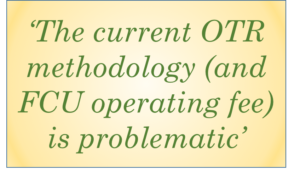April 22, ’16 NASCUS Report
Posted April 22, 2016WA regulator seeks OTR methodology revision

Noting concern with the rising rate of the overhead transfer rate (OTR), and a corresponding declining rate for the federal credit union operating fee, the Washington State Department of Financial Institutions (WDFI)/Division of Credit Unions has asked NCUA to revise its OTR methodology to “rely on safety and soundness examinations of FCUs and FISCUs to the maximum extent feasible, as a cost savings to the insurance fund.” In a comment letter to the agency on the issue (ahead of next Tuesday’s comments-due date), Linda K. Jekel, WA Director of Credit Unions, noted that the OTR has been climbing since the year 2000, after standing at 50% for 14 years. “Correspondently, the FCU operating fees have declined over recent years. This is surprising during a time of significant changes to the consumer compliance related rules and additional supervision over interest rate risk and cybersecurity,” she wrote. The Washington state regulator asserted that the current OTR methodology (and FCU operating fee), is “problematic” in that NCUA policy is to transfer the safety and soundness examination work from its chartering supervision to its insurance duties.
NASCUS President and CEO Lucy Ito thanked Jekel and all those who have submitted comment letters to date, and reminded others who are either working on letters or considering whether to submit that April 26 is the comments deadline. “NASCUS has a number of materials – including a video highlighting some key points to consider – for commenters on our website,” Ito said. “If your agency, credit union or group has an interest in this issue, please join the conversation and submit your views by next Tuesday.”
LINKS:
WA Division of Credit Unions OTR comment letter
Video: 5 key points to make in OTR comment letters
OTR Resources
NEW PROPOSAL ON EXEC PAY REPORTING AFFECTS LARGEST FICUS
More than 250 large federally insured credit unions – both federal and state chartered – would be required to report certain executive compensation in “sufficient detail” to allow regulators to gauge whether it is excessive or could lead to material loss, under a proposal issued unanimously Thursday by the NCUA Board. The proposed rule is part of a joint regulation being issued by all federal financial institution regulatory agencies; NCUA was the first to issue a rule (largely because the agency’s board was meeting before scheduled meetings of other agency ruling bodies – which includes the Fed, FDIC, OCC, FHFA and SEC). Those other agencies are expected to issue their proposals soon, with the same or similar comments-due date of July 22. This is the second time a proposed rule on executive compensation – required by the Dodd-Frank Act of 2010 – has been issued for comment. The first proposal was issued in 2011; this year’s proposal supersedes that one, according to NCUA.
The proposal establishes a three-tiered system for covered financial institutions: $250 billion or greater in assets (Level 1), $50 billion up to $250 billion in assets (Level 2), and $1 billion up to $50 billion in assets (Level 3). However, NCUA added, as of the end of 2015, there were no federally insured credit unions in Level 1, one in Level 2 and 257 in Level 3. Much of the rule, according to NCUA, addresses requirements for pay arrangements for senior executive officers and “significant risk takers” at Level 1 and Level 2 institutions. However, all levels of institutions must annually create and retain for seven years records which document the structure of pay arrangements and appropriate oversight of the arrangements from boards of directors. Also, all covered institutions are subject to the proposed rule’s general prohibition on incentive-based compensation arrangements that would encourage “inappropriate risks by providing excessive compensation or that could lead to material financial loss.”
Base salary or base benefits for credit union executives in Level 3 is not affected in the proposal, and plans that are in place prior to the compliance date would be grandfathered in. However, more rigorous requirements would apply to the single CU in Level 2 (which is Navy Federal Credit Union). Additionally, CUSOs are not covered by the NCUA portion of the proposed rule. The agency plans to issue guidance for credit unions on the rule once it is finalized. For more coverage of the proposal, an NCUA summary of the proposal, and the NASCUS 2011 comment letter, see the links below.
LINKS:
NASCUS coverage of NCUA April 21 board meeting
NCUA summary on proposed executive compensation rule
NASCUS 2011 comment letter on incentive-based executive compensation
MATZ, IN FAREWELL, SAYS THANKS; REMAINING DUO OFFER THOUGHTS
Calling the position of chairman of the NCUA Board “a most challenging and gratifying experience,” departing Chairman Debbie Matz said she is leaving the agency “convinced the CU system is positioned for growth and success for the future.” She also thanked credit unions for working with their members to extend credit during the economic downturn of 2008-10, which she called the “worst financial times of our lives.” Her fellow board members – Vice Chairman Rick Metsger and Mark McWatters — also offered her thanks and praise, which was followed by applause from the audience. Metsger noted the chairman’s grace under pressure, and McWatters commented that any differences between him and Matz were only on policy – and never personal. She leaves the agency officially April 30.
NEW NCUA REGION V DIRECTOR TAKES OVER IN MAY
Cherie Freed is the new Region V NCUA Director, replacing Elizabeth Whitehead, who retires in May, the agency announced this week. Freed joined the agency in 1987 as an examiner, following two years in the private sector, NCUA stated in a release. Before her selection as Regional Director, the agency state that she served as the associate regional director for operations in Region V. She has also served as the agency’s acting deputy executive director, Region V director of supervision, a loss-risk analysis officer, a corporate credit union examiner and a problem case officer. Whitehead is retiring after 28 years with the agency.
CONSUMER BUREAU DIRECTOR RESPONDS TO LAWMAKERS ON EXEMPTIONS
Citing nine specific areas where his agency has “taken a number of steps to provide relief to small financial entities” (including credit unions) in rulemakings, Consumer Financial Protection Bureau Richard Cordray has responded to 329 members of Congress who urged him earlier this spring in a letter to exempt those small institutions from the agency’s rules. Among the areas the director cited where the CFPB has taken action: expanded the mortgage “safe harbor” for small creditors; relaxed requirements for appraisals; exempted small servicers from providing periodic statements; exempted lower-volume depository institutions from HMDA reporting. Cordray was responding to a March letter from lawmakers on both sides of the political aisle urging the CFPB to use its authority under the Dodd-Frank Act to exempt credit unions from certain rulemakings. (Under Section 1022(b)(3)(a) of the Act, the bureau’s director has the power to exempt “any class” of entity from its rulemakings.) The letter was originally circulated by Reps. Steve Stivers, R-Ohio, and Adam Schiff, D-Calif.
LINK:
Cordray response to lawmakers on CFPB exemptions
HOT ISSUES HIGHLIGHT AGENDA FOR SUMMIT ’16 IN CHICAGO
The coming wave of fintech, the new “current expected credit loss” model (CECL) from the Financial Accounting Standards Board  (FASB), the impact of the 2016 election campaigns on Congress, interstate branching – and more – are all on the agenda for the 2016 NASCUS State System Summit, Oct. 5-7, in Chicago. The three-day meeting is the only annual event for the nation’s state credit union system, which brings together credit union regulators and practitioners for mutual exchange and dialog in educational workshops, insightful discussions and networking events geared specifically toward CEOs, state regulators and industry leaders. Register before July 31 and earn savings on registration fees! Check out our full agenda (and more) at the link below.
(FASB), the impact of the 2016 election campaigns on Congress, interstate branching – and more – are all on the agenda for the 2016 NASCUS State System Summit, Oct. 5-7, in Chicago. The three-day meeting is the only annual event for the nation’s state credit union system, which brings together credit union regulators and practitioners for mutual exchange and dialog in educational workshops, insightful discussions and networking events geared specifically toward CEOs, state regulators and industry leaders. Register before July 31 and earn savings on registration fees! Check out our full agenda (and more) at the link below.
LINK:
2016 NASCUS State System Summit/info (including hotel), agenda and registration
BRIEFLY: Go back to summer school with NASCUS
“Summer school” takes on a whole new meaning with a strong line-up June through August of NASCUS educational opportunities for the state credit union system– starting with our June 7-8 MBL School in New Orleans. Focusing on the new regulation adopted by NCUA this spring (and which takes effect, for the most part, Jan. 1, 2017) the school offers 16 hours of intense instruction designed to prepare credit union regulators and practitioners for effectively dealing with the new rule. The other opportunities include: July 14 — MA/NH/RI Directors College, Marlborough, Mass.; Aug. 1-2 — NASCUS/CUNA Cybersecurity Symposium, Chicago; Aug. 29 — 2016 Ohio Credit Union Day, Columbus. See the information at the link below for more details, including registration.
LINK:
NASCUS 2016 Summer School opportunities
Information Contact:
Patrick Keefe, NASCUS Communications, pkeefe@nascus.org or (703) 528-5974
For more information about NASCUS's news and/or public relations, please contact our Marketing and Communications Department.
